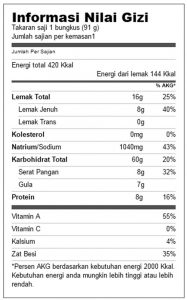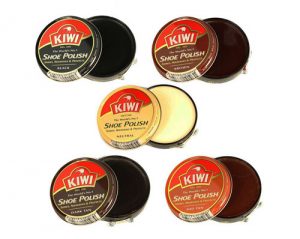 Supermarket Savvy
Supermarket Savvy
Learn how to read a food label to cut calories, increase dietary fiber intake and make healthier choices. A powerful lot of nutritional info is packed into the tiny “Nutrition Facts” panel. First check out the caloric intake of one serving, the amount of the product typically consumed at once. 2,000 calories is the average daily reference amount that you should shoot for. Dial down your daily sodium intake to less than 1,500 mg (about 2/3 teaspoon of salt). Keep saturated fats to less than 20 gr or replace salt with unsaturated fats, whole grains, fruits and vegetables. Your consumption of added sugar should be no more than 25-35 gr. Dietary fiber should be at least 28 gr to avoid constipation and maintain overall digestive health. Nutrients such as fats, cholesterol, carbohydrates and protein are also listed, as well as select vitamins and minerals. Most people living in Indonesia automatically get enough proteins every day by eating a variety of foods. Tofu, tempe and beans (kacang merah, kacang polong, kacang hitam/undis, kacang kara, etc.) are among Indonesia’s richest sources of plant-based protein and also give dietary fiber.
Air Travel Bummers
Lion Air, Wings Air and Citilink airlines no longer include any checked baggage in their ticket prices. (Passengers in the past were given an allowance of 20 kg included in the ticket price). One way to save money is to pre-pay baggage fees at the same time you purchase your ticket or at least six hours prior to departure. The cheaper pre-paid baggage fees for Lion Air will be Rp42,000/5 kg, Rp83,000/10 kg, Rp124,000/15 kg, Rp165,000/20 kg. *More stringent standards are now being applied to the condition of passports of those who are traveling to and from Indonesia. Up to 20 passengers to Indonesia are denied boarding in Australia in a single month due to damaged passports. *Heads up during the upcoming peak Chinese New Year holiday travel period 01 Feb-10 Feb when there will be at least a 5% increase in the number of air passengers.
Health pointers
People who nap each day for 60 minutes have significantly higher tolerance for frustration and more focus than people who don’t. *Get a free document at www.celiactravel.com that’s translated into Indonesian that you give to waiters, concierges, physicians and others who are in a position to help you with your Gluten Free diet while you’re traveling in Indonesia. For example, kecap manis (sweet soy sauce) is loaded with gluten. *As you get fitter working out, increase the time and/or intensity of the sessions. A few short exercise bouts per day are just as helpful as doing longer sessions and can feel more doable. Aim for 10-minute mini workouts 2-3 times daily. Go for a walk around the block a couple of times at lunch and then repeat before dinner. *Use Peditox (Rp5000 per 20-gram bottle) to get rid of hair lice. *The Heimlich maneuver has saved hundreds of thousands of people from choking to death since 1974. Illustrations on how to administer it are found on the Internet. *Some Bali pharmacies have a doctor on the premises who can be consulted for free.
Life-savers
Expats on Bali tend to go to seed healthwise once they move to Bali (smoking, excess drinking and lack of exercise do not help). For those over 40, get a comprehensive annual health screening in Singapore, Malaysia, Thailand or Australia so that any potential or developing maladies can be identified and treated before they get worse and infinitely more expensive. These killer diseases must be caught during the “golden hour” of intervention. Do the screening on a visa run or weekend break from Indonesia.
 Make shoes last
Make shoes last
Give them a break; don’t wear the same pair every day. After each wearing, clean shoes with soft, dry cloth. Keep shoes on a shoetree. Store shoes in a dry area where they can get fresh air and not mold. Give perspiration and other moisture time to dry out completely. If shoes get wet, stuff them with newspaper and let them dry slowly. Keep leather shoes lubricated and protected by polishing them regularly, using a polish with a high wax content like Kiwi Shoe Polish (Rp25,000/36 gr). Don’t use liquid polishes that contain little or no wax and may cause shoes to dry out.
Cash Wise
Try this old-school way of saving: set up automatic weekly or monthly transfers of small amounts from your main account to another account used strictly for savings – a simple, quick and out-of-mind way to build education, vacation or emergency funds. *Be careful renting out your house while you’re away. Either the neighbors, competition or the local banjar will be interested in what you’re doing and it might trigger a visit by the authorities checking tax and licenses. Bali’s Hotel Association has pressured government to ban illegal villas in Bali as they are biting into hotel profits. If the authorities find out that you rent out a few rooms without a pondok wisata permit, you can be deported. The authorities have become more and more diligent in finding villa owners who are not complying with the law. *January is the time to keep better track of home finances. Apache Open/Office and Libre-Office, free open source suites that run on Windows, Mac and Linux systems, come with spreadsheet programs. Select one of their “personal budget” templates. Just type over the sample numbers with your own information and the software does the rest. *You no longer need to spend Rp10 juta on the latest iPhone model. Huawei and Samsung have flooded the Indonesian market with lower-cost Androids that have become just as functional. Though they may not have all the newest features like animated emojis and Face ID, there’s not much that you can’t do on these sturdy and reliable rival phones. *Besar pasak daripada tiang (“The peg is bigger than the pole”) or expenditure is way bigger than the potential income.
 Keep Tires in Top Condition
Keep Tires in Top Condition
Today’s longer-lasting tires that can endure over 80,000 km before they wear out through heat, environment and Bali’s potholes, make safety checks more critical than ever. Underinflation can weaken tires, so check air pressure each month before tires have been driven more than a few km. Inflate tires according to the air pressure listed on the plate on the door jamb, inside the glove compartment or fuel-filler door. (The pressure on the tire’s sidewall is the maximum pressure for the tire.) For safety’s sake, replace any tires that have cracks (retak), cuts or bulges in the tread or sidewall. Also check for uneven tread wear, which typically points to poor wheel alignment or worn or broken suspension. Always have your car’s alignment and suspension checked before mounting new tires to avoid premature wear. Stay within the vehicle’s weight capacity listed on the door jamb plate. Overloaded tires run hotter, increasing the chance of a blowout. After several years, if the tread is worn down and the rubber loses its softness and begins to feel hard (mengeras), it’s time to shop for replacements. Tip: No. 1 tire available in Bali is Bridgestone (Rp650,000-Rp800,000); No. 2 is Dunlop (Rp600,700-Rp700,000).
Please send your budget ideas, bargain deals and money saving tips to pakbill2003@yahoo.com
Copyright © 2019 Bill Dalton
You can read all past articles of
The Frugal Balinist at www.BaliAdvertiser.biz